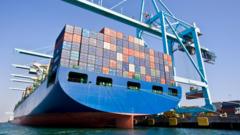In response to U.S. trade tariffs, Honda has announced the relocation of CR-V production from Canada to the United States, alongside a postponed $11 billion investment in electric vehicle manufacturing in Ontario.
Honda Shifts SUV Production to U.S. Amid Tariff Challenges

Honda Shifts SUV Production to U.S. Amid Tariff Challenges
Honda's strategic manufacturing shift highlights the impact of U.S. tariffs on Canadian auto production.
Honda's recent decisions signal significant shifts in the Canadian auto industry, exacerbated by ongoing U.S. tariffs. In an announcement made on Monday, Honda's chief executive, Toshiro Mibe, confirmed the relocation of production for the popular CR-V SUV from Alliston, Ontario to a factory in the United States. This change is a direct reaction to the 25 percent tariffs imposed by the U.S. on many Canadian automobiles and auto parts. Additionally, the company has decided to postpone plans for a major electric vehicle and battery factory in Canada, estimated at $11 billion.
This move poses a considerable challenge for Canada's newly elected prime minister, Mark Carney, who recently came to power on a platform promising strong leadership amid a contentious trade war with the U.S. Initially, just weeks ago, Honda dismissed reports that suggested tariff pressures would hinder their Canadian operations. However, the company's latest announcement reflects a broader trend within the auto industry, which has faced increased scrutiny and setbacks following the introduction of U.S. tariffs.
Mibe outlined the necessity of optimizing production as central to Honda's decision, attributing the move to sluggish growth in the electric vehicle market. This planned investment was once touted as transformative for Canada’s automotive landscape, backed by significant incentives from both the federal and provincial governments. If realized, it was expected to create approximately 1,000 jobs and revolutionize Ontario's auto sector by pivoting towards electric manufacturing.
The implications of Honda’s decision for Canadian employment remain unclear. Currently, Honda's plant in Alliston employs around 4,200 people, producing the Civic sedan and engines in addition to the CR-V. Notably, the majority of vehicles assembled there are exported to the U.S.
Mark Carney's office has not yet commented on this setback, even as he prepares to officially appoint his new cabinet amidst growing concerns regarding the trade impacts on Canada's automotive industry. Honda’s announcement reflects a worrying trend among automakers, including Stellantis, General Motors, and Ford, all of whom have curtailed or suspended expansion plans in Canada due to U.S. tariffs.




















